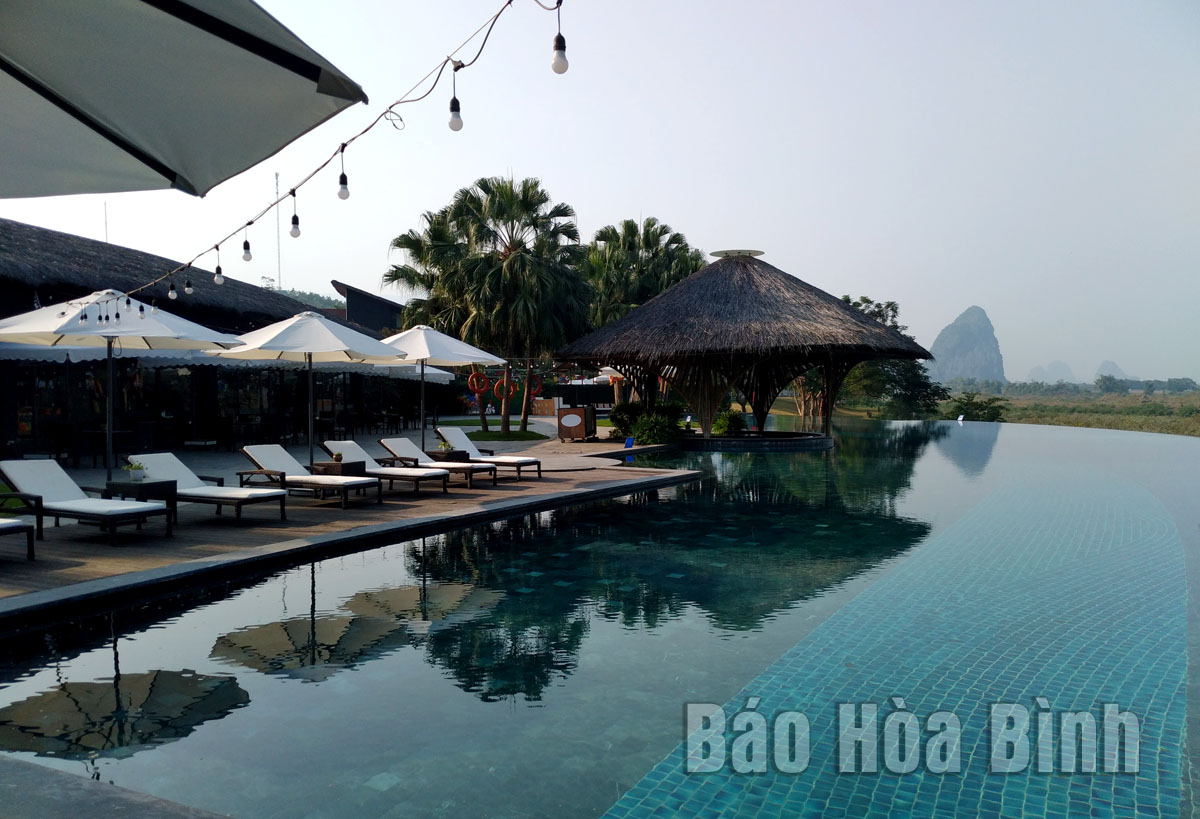
(HBO) – Kim Boi district, owning rich natural resources, especially the precious hot mineral source and various landscapes and the unique culture of Muong ethnic minority group, has great potential in promoting socio-economic growth, especially the tourism sector.
Serena Resort in Sao Bay commune of Kim Boi is an attractive destination for visitors.
For years, Kim Boi has clinched its position in the national tourism map thanks to its hot spring system. Over the years, the locality has proved its position with many high quality tourist attractions, including Serena Resort in Sao Bay commune, which covers about 30 hectares in the first phase. The four-star resort comprises high-end villas, convention halls, a restaurant, a hot mineral water swimming pool, and Japanese style onsen areas.
Besides, Kim Boi is also home to many other attractive tourism destinations such as An Lac Ecofarm, V’Resort Vinh Tien, and Cuu Thac Tu Son.
Nguyen Phuong Lan, a visitor from Hanoi who came to Kim Boi for the first time, showed her pleasure at the fresh air in the area as well as the hospitability she received. She said she will bring her family to Kim Boi at a convenient time.
In recent years, the number of tourists to Kim Boi has increased. Last year, the figure reached 450,000, including over 1,000 foreigners, who spent over 394 billion VND (16.5 million USD). In the first six months of 2023, the district welcomed 250,000 visitors, including more than 1,000 foreigners, with a revenue of 180 billion VND.
By now, Muong Dong area has attracted the interest of many investors with 25 projects, including Habi Valley Kim Boi residential-urban complex, Cuoi Ha tourist site, and Binh Son golf course. APEC Group is also building a five-star hotel and resort in Mo Da area in Bo township, while SunGroup has invested in a culture-tourism-service complex in Lac Son and Kim Boi districts.
Hoang Tuyet Mai, CEO of An Lac EcoFarm& Hot Springs, said that in order to provide a green, clean, and beautiful environment to visitors, firms have focused on preserving local landscapes to keep their natural beauty.
In the future, Kim Boi aims to become a high-end ecological and resort area. Currently, the construction of the Hoa Binh-Hanoi expressway and Son La expressway has been launched. Along with 12B Road, the project will help Kim Boi become a large-scale tourism area which takes only 1 hour driving from Hanoi.
In order to promote its potential and strengths, Kim Boi has focused on enhancing the quality of tourism services, striving to become a high-quality tourist destination of Hoa Binh. With a proper development direction, Kim Boi’s tourism sector is expected to "take off” in the time to come./.
Located just a 20-minute drive from Hoa Binh City, Ora Hill Farmstay & Glamping Hoa Binh is a captivating new destination nestled in Mo hamlet, Bình Thanh commune, Cao Phong district. Combining farming with leisure, this tranquil retreat is perfect for those seeking balance, joy, and an immersive experience in the expansive beauty of nature.
Muong Bi - Tan Lac is renowned as one of the four famous Muong regions in Hoa Binh province. Blessed by nature with a favourable climate and stunning landscapes, Tan Lac holds great advantages for tourism development. The local tourism industry has made remarkable strides in recent times thanks to the attention and support from the local authorities and sectors.
With its strategic location, well-developed transport network, and diverse soil and climatic conditions, Hoa Binh is emerging as a must-visit destination in Vietnam's northwestern tourism corridor. The province boasts numerous attractions, including the Kim Boi hot springs (Kim Boi district), the Dau Rong cave complex (Cao Phong), the Mai Chau valley (Mai Chau), and the iconic Hoa Binh hydropower plant.
The northern mountainous province of Hoa Binh has been listed among the 71 most beautiful places to visit worldwide by the prestigious US travel magazine Condé Nast Traveller.
Hoa Binh province’s rich natural and cultural resources position it as a prime location for developing community-based tourism (CBT). In recent years, support from central and provincial policies, as well as assistance from non-governmental organisations, have encouraged local ethnic minority and mountainous communities to actively engage in the sector.



